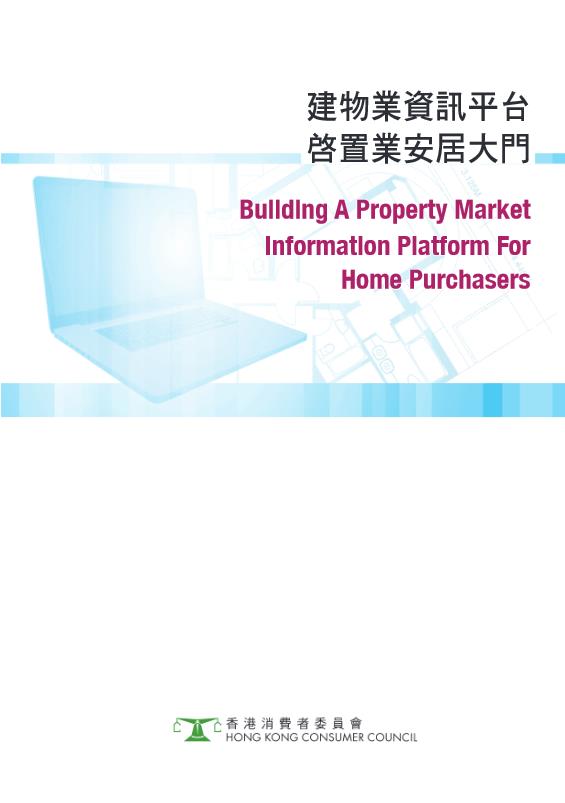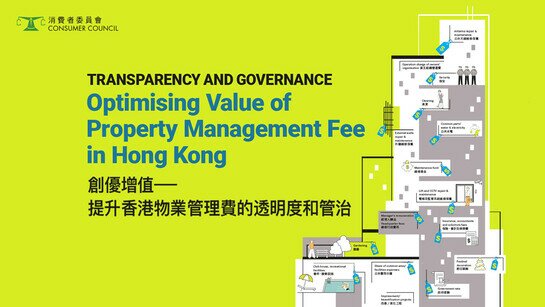
Introduction
- The Consumer Council (the Council) has observed disquiet regarding the provision of information to consumers in the first-hand private residential property market. Accordingly, the Council conducted this study on the general availability and reliability of property market information, and the practices that have been employed by market players regarding the release of information to prospective purchasers in respect of particular developments.
- In general, prospective purchasers want to know two things. First, what the market conditions are, particularly in the context of whether it is a good time to buy. Second, whether a particular property suits their needs. On both of these, they want assurance that the information they receive is reliable. In other words, it is truthful, timely and complete.
- The Council welcomes initiatives launched by the Government over the past two years to enhance the transparency and clarity of property information on uncompleted first-hand private residential properties. In particular, the latest nine new measures work towards information transparency and fair deals and have achieved initial impact. To build on the existing safeguards, the Council has made in this report suggestions to further enhance information transparency in the first-hand residential property market to better protect the interests of prospective purchasers of private residential properties.
Study Methodology and Findings
- For the study, the Council conducted general research and undertook a series of field visits of developers' sales offices to examine how information was disseminated to prospective purchasers of first-hand private residential properties. Field visits were conducted by Council staff between 12 April and 27 June 2010, involving 19 private residential development projects. The Council's findings as set out in section 2 are based on field visits of the 19 development projects during the said period.
- The development projects comprised both completed and uncompleted first-hand private residential properties, covering various stages of sales, i.e. at first sales, and at sales that had been launched for a relatively long period of time. This study was not directed at residential units in the second-hand market or commercial or industrial buildings.
- In the study, the Council also considered the Government's enhancement measures for flat sales, implemented through the Lands Department's Consent Scheme and the Real Estate Developers Association of Hong Kong's (REDA) Guidelines on Sale of Uncompleted Residential Properties (issued on 1 June 2010), concerning the provision of information in the first-hand private residential property market.
- Notwithstanding the enhancement measures, the Council considers that further improvements can be made to build on the existing measures to protect the interests of prospective purchasers of first-hand private residential properties.
- In this study, the Council has explored:
- the general availability of property market information that prospective purchasers may have at their disposal and the accuracy and reliability of such information to enable them to better understand the market and make informed decisions;
- the practices that have been employed by developers and sales agents regarding the release of information to prospective purchasers on particular developments; and
- whether appropriate information is readily available and accurate.
- The Council's findings can be summarised as follows:
Absence of comprehensive source of information
- Prospective purchasers do not have an easily accessible source of information that provides an accurate and complete picture on the market as a whole, in terms of the number of flats for sale or sold, and their sale prices, in order to assist them in making a decision as to when to enter the market. While relevant information may be obtained from a number of diverse sources, the average consumer would not have the necessary skills, or the time, to adequately process all the available information.
Information varies in reliability
- It is common that media reports on announcements by developers, promotional materials, and comments by sales agents will selectively cast favourable light on particular developments. It is difficult for prospective purchasers to gauge how much credibility can be given to the information, and the extent to which it resembles the truth. Prospective purchasers need to be sure that there are safeguards in place to discourage persons from engaging in misleading and/or deceptive conduct.
Sale by small batches
- It appears to be common practice for developers to release units in small batches to test the market, and to subsequently raise prices after getting a favourable initial market response. The consequential disadvantages to prospective purchasers are a reduction in choices and increasing property prices. The Government's latest enhancement measures require developers to include in the first price list for each batch of sale increased number of units to be covered in the first price list, from the minimum of 20 units (or 20% of the total number of units put up for sale) to a minimum of 30 units (or 30% of the total number of units put up for sale ) for small-scale development, and a minimum of 50 units (or 50% of the total number of units put up for sale) for large-scale development, which may help alleviate the problem of lack of choice to a certain extent.
High pressure sales tactics
- Some sales agents play on the natural anxiety of prospective purchasers and attempt to induce them into making hurried purchase decisions. For example, by promising that favourable treatment will be given if a deposit or any other consideration is given immediately and concocting information that is suggestive of future rising prices and scarcity of supply. Moreover, the tactics are carried out in an environment, for example, through one-way flow control arrangement, that increases anxiety levels and makes it difficult if not impossible for prospective purchasers to undertake a thorough and useful inspection of a property. These might lead prospective purchasers into making hurried decisions to buy properties that ultimately prove to be unwise and even damaging to their interests.
Recommendations
- To address the above concerns, the Council has proposed the following recommendations:
Clear guidelines regarding pre-launch activities of first-hand properties
Recommendation 1: Developers and sales agents should refrain from releasing unofficial "intentional prices" or using any other imprecise terms relating to the potential price of flats to be offered for sale, and from taking a deposit or any other consideration, before an official launch of flat sales.
- At present, it is difficult for prospective purchasers to verify whether developers or sales agents have released false information for the purpose of creating the impression of a robust market and thereby talking up property prices and sales. When this conduct is combined with offers by sales agents to accept a deposit or similar consideration, it compounds the anxiety among prospective purchasers to move quickly on a purchase. This only exacerbates the potential for artificially inflated prices, and may lead to unwise purchases. The Council considers that prohibitions should be introduced to limit this sort of possibly speculative information dissemination by developers and sales agents. (Paragraphs 3.2 to 3.6 of the study report refer)
- The Council accepts that there may be practical difficulty in effectively preventing such price information from being circulated in the market, as it is almost impossible to verify whether it is the developers, market analysts or reporters who are responsible for the release of those prices. However, the Council is of the view that it is important for the Government to send a clear message of its disapproval of releasing confusing and possibly misleading pricing signals to the market.
Recommendation 2: If "private sales" are to be allowed, they should be properly defined, and an upper limit on the percentage of units available for "private sale" should be reinstated.
- Sale for most of the development projects under study was promoted as "private sale" but the units concerned were found to be open for sale to the general public. In these circumstances, a question arises as to whether describing sale of units as "private sale" when they are in fact generally available is a deceptive ploy. The Council recommends that the Government make it clear whether "private sales" are allowed to exist, and if so reinstate an upper limit on the percentage of units available for "private sale", for example, 5%. Conditions should also be imposed on how information is disseminated to the public regarding this type of sales. (Paragraph 2.9 Part A refers)
Removing impediments to viewing of show flats
Recommendation 3 Measures should be introduced to ensure prospective purchasers have sufficient time for viewing of show flats, i.e. to discourage the setting of conditions or restrictions for prospective purchasers, such as imposing onerous registration and appointment procedures, and imposing obstructive one-way flow control arrangements for the viewing of show flats.
- The Council's past experience and current field visits (before the Government's introduction of the new enhancement measures) found that the procedures by which a few sales offices guided the activities of prospective purchasers when viewing show flats created an environment that was not conducive to making careful and considered purchase decisions.
- Such procedures raise anxiety levels on the part of prospective purchasers and can also prevent competition from operating effectively in the market, since purchase decisions are swayed more by questionable sales tactics rather than close inspections of potentially suitable properties and correct assessment and comparison of different properties on offer in the market. The Council considers that measures need to be introduced to ensure prospective purchasers have sufficient time for inspecting show flats, to enable them to undertake comprehensive inspections. (Paragraphs 3.7 to 3.12 refer)
Controls over unreliable and deceptive representations
Recommendation 4: Sales agents should refrain from distributing unauthorized materials (i.e. their own materials) to prospective purchasers at sales offices, unless there is an accompanying statement quoting the date and the source of the information.
- The Council's field visits and complaints indicated that some sales agents played on the natural anxiety of prospective purchasers, and attempted to induce them into making hurried purchase decisions by speculating on matters such as future rising property prices and scarcity of supply. In some cases, to establish their point, sales agents supplied handouts they prepared, in addition to the sales brochures and price lists. (Paragraphs 3.35 to 3.38 refer)
- The existence of this sort of unofficial information, particularly in the context of high pressure sales chatter, simply adds to the anxiety and confusion that can arise in making a purchase decision. The Council therefore recommends that the distribution of unofficial materials by sales agents should be prohibited, or at the very least that any information not officially produced by the developer should, apart from having the consent of the developer, include a qualification that the information is not official, and that the material prepared should clearly indicate the basis upon which the information relies.
Provision of timely and useful transaction information
Recommendation 5: An online "Property Market Information Platform" (PMIP) should be established to enable the general public to obtain, through an independent and authoritative source, comprehensive property market information regarding first-hand private residential properties in Hong Kong.
- In its 1996 report "How Competitive is the Private Residential Property Market?", the Council recommended, amongst other proposals, that the Government should facilitate consumer access to reliable property information by allowing public access to a centralized housing property database that provides information on the property market and housing development data.
- The Council reiterates its previous recommendation of improving the flow of property information by setting up a centralized property information platform for public use to provide accurate, up-to-date and authoritative information about the property market.
- The Council strongly believes that an online "Property Market Information Platform" (PMIP) should be established to enable the general public to obtain, through a 'one-stop' service comprehensive property information, and such a platform will also enable the Government to monitor transactions in the first-hand private residential property market in Hong Kong. To ensure that the PMIP commands credibility and recognition, the Council considers that it should be set up and managed by an authoritative and independent body, for example, the Government.
- The proposed PMIP should pull together existing data of developers on an individual development project basis, and relevant information provided by various government departments. The PMIP should provide prospective purchasers with a timely benchmark of current transaction prices and unit availability concerning residential development projects, and there should be the requirement that information be posted on the platform within 24 hours (real time in the long run) after the signing of a Preliminary Agreement for Sale and Purchase (PASP), as well as after the signing of the formal Agreement for Sale and Purchase (ASP).
- Similar systems exist in other jurisdictions with the same market characteristics as Hong Kong. (Paragraphs 4.3 to 4.21 refer)
- The Council understands that the establishment of the proposed PMIP requires immense manpower and capital resources, and professional know-how to collect, verify and update information. There is also the issue of legal liability on the accuracy of the information. But the benefits of such a platform to various parties as well as to the economy as a whole should not be brushed aside. It will be particularly instrumental in view of great public concern regarding recent incidents of cancellation of alleged sales, and also the drop in Hong Kong's real estate transparency ranking (according to a recent global real estate market study).
Provision of sales brochures and price lists
Recommendation 6: Sales brochures and price lists should be made available at sales offices for distribution to prospective purchasers at the time of sale (i.e. throughout the entire sale period) and should be made available before the viewing of show flats.
- The Council observed that at a few developments (before the introduction of the new enhancement measures), either sales brochures or price lists were made available to prospective purchasers. Some of these cases were sales that had been launched for some period of time. In such cases, prospective purchasers had to rely on supplementary information provided by sales agents. Where sales brochures and price lists were available, they were not easily accessible or were placed on the sales desks at the very late stage before prospective purchasers left the sales offices. As a result, prospective purchasers did not have the opportunity to bring sales brochures along with them for cross references when viewing the show flats.
- Current rules only require sales brochures and price lists to be made available prior to the commencement of sale and they only apply to the sale of uncompleted residential properties. As this is a requirement beneficial to prospective purchasers, the Council considers that it should be extended to cover completed residential properties as well. Moreover, the sales brochures and price lists, for both uncompleted and completed residential properties, should be made available to prospective purchasers at the sales office before the viewing of show flats. This would facilitate the process of making informed decisions and would also assist either those who do not have access to computers and printers to be able to download relevant information from developers' websites, or those who do not know how to use them. It would also enable prospective purchasers to make comparisons with the information that is presented on a developer's website or generally in the show flats. (Paragraphs 3.26 to 3.34 refer)
Recommendation 7: The time gap (currently up to 5 days) between the sale of a flat and the release of the transaction record on developers' websites and the proposed PMIP should be shortened.
- Timely information is often critical for making a wise purchase decision, especially where pressure is being placed by sales agents to commit to a deal. The Council therefore recommends that developers be required to post property related information (including price lists, the number of units available for sale and transaction information) on the PMIP once the information is made available to the market (i.e. to post after signing of a PASP or ASP). This is in addition to providing the information on developers' websites and displaying it at the sales offices.
- This would enable the public to more quickly ascertain whether developers have actually sold their properties for the price they claimed to be selling at, and to have accurate property information (e.g. the units available and the offer price) to assist in their purchase decisions. (Paragraphs 3.39 to 3.43 refer)
- For certainty of information, it would be useful to have reference to transaction information which is set out in ASPs instead of PASPs. Moreover, taking into account the need to make timely information available to prospective purchasers to facilitate their purchase decision, the Council considers that requiring developers to post information about transaction cancellation on the PMIP may help address the concern about inflated sales or inaccurate transaction information resulting from uncompleted transactions. Taking Beijing as an example, Beijing's Real Estate Transaction Network has in place some measures such as issue of public notices on violations by developers in respect of reporting false sales through repeatedly posting and withdrawing offers from the transaction network, and providing sales performance data that do not match the sales records on the city's information network.
Complete information on price and units for sale
Recommendation 8: A facility for prospective purchasers to examine the PMIP be provided at the time of sale.
- Presently, prospective purchasers rely on information in sales brochures and price lists, and material supplied by sales agents whose primary concern is to procure a sale. The problem of the making of misleading claims on pricing and availability of units, future performance and so on can be contained, and the anxiety caused by lack of verifiable information can be alleviated, if prospective purchasers are able to check on a range of related matters at the time of sale.
- The proposed PMIP is aimed at providing an extensive source of information. The Council therefore recommends that the PMIP must be provided in real time at the sales office where a prospective purchaser pays a deposit or enters into an agreement. Having this facility on site and readily accessible will enable prospective purchasers to consider a range of relevant information, thereby assisting them to make an informed choice. This would strengthen prospective purchasers' confidence in the accuracy of information upon which their purchase decision is based.
Strengthen the existing complaints handling mechanism
Recommendation 9: An element of neutrality should be introduced in REDA's preliminary complaints screening process.
- Prospective purchasers need the assurance that there are safeguards in place to properly handle complaints, for example regarding misleading information in the sale of private residential properties. The Council recommends that measures be undertaken now to provide some safeguards for consumers by way of strengthening the existing industry measures that address misleading and deceptive conduct in the real estate sector.
- Currently only developers and their staff or agents are involved in examining whether complaints made to REDA should be followed up. The Council considers that the absence of a neutral element in REDA's preliminary decision making process should be addressed. The Council recommends that the essential element of neutrality, which can be found in the process of REDA's Compliance Committee, should also apply to the preliminary examination of complaints, since both processes are equally important in the delivery of satisfactory outcomes, and both should observe the principle of neutrality.
Conclusion
- At present, prospective purchasers of first-hand residential properties face an asymmetry of information when compared to developers and sales agents. Accordingly, they are not likely to be in a position to get clear, accurate and comprehensive information before making their purchase decisions, although such information would be conducive to making wise purchase decisions.
- The Council considers the above recommendations to be both pertinent and proportionate in protecting consumers who are buying what is likely to be the single most expensive purchase in their life. In addition, given the importance that information has in a competitive marketplace, the measures proposed should also be of benefit to the real estate sector as a whole.











